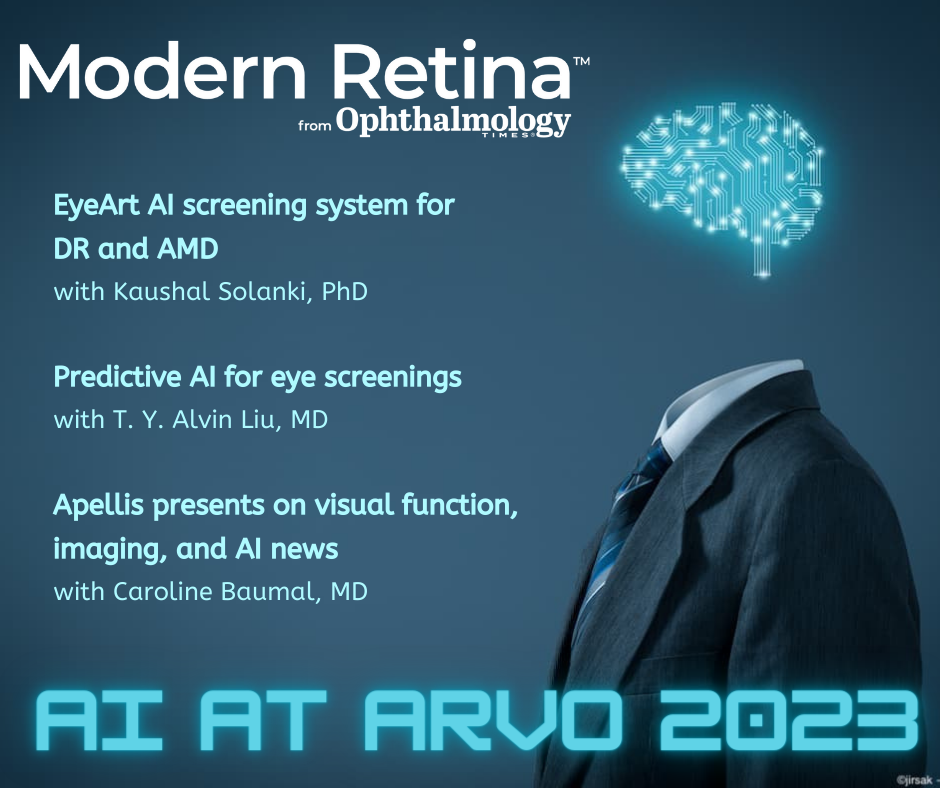AI advancements in ophthalmology: What’s new in 2023 so far
Modern Retina is looking back at the first half of 2023 as we explore the role of AI in the retinal field in anticipation of the changes to come.
Modern Retina is looking back at the first half of 2023 as we explore the role of AI in the retinal field in anticipation of the changes to come. (Image Credit: Adobe Stock/putilov_denis)

This year has already seen new advancements in technology that have the power to change the way that ophthalmologists image, diagnose, and monitor patients and their conditions. The rapid pace of news can make it difficult to keep with the ever-evolving industry. As new tools and treatments come to market, it can be important to take stock of how these products and solutions have moved through development and testing.
As the entire medical community looks toward the future and the solutions these advancements may provide, Modern Retina is looking back at the first half of 2023 as we explore the role of AI in the retinal field in anticipation of the changes to come.
2023: Top 5 predictions for ophthalmology in the New Year
In January of 2023, Joshua Mali, MD shared 5 predictions for what the year ahead would hold. One of his predictions was that Retina analytic tools will be the new emerging industry. So far, this prediction has been spot on as we see not only the imaging tools themselves continue to improve, but the use of AI to analyze these images become more and more prominent.
Read more of Mali’s predictions.
Eyenuk receives approval to market AI screening system in EU
In late January, Eyenuk received approval to market its AI eye screening system, called EyeArt, in the European Union. Previously approved by the Eu for detection of diabetic retinopathy, this new approval expanded the system’s use to include detecting age-related macular degeneration (AMD) and glaucomatous optic nerve damage (glaucoma). Read more about this approval.
In April, our team traveled to the 2023 ARVO Annual Meeting in New Orleans. There, they caught up with Kaushal Solanki, PhD, CEO and founder of Eyenuk. Solanki gave an on-camera interview in which he shared more about the EyeArt system and its approvals and clearance by the EU and the FDA. Watch the interview.
AI may help with estimate of retinitis pigmentosa progression
According to Daisuke Nagasato, MD, PhD, and colleagues, AI with ultra-widefield fundus autofluorescence images may be helpful to objectively estimate progression of retinitis pigmentosa (RP) and visual function. Their study, published in February, shares why this is critical for adequate assessment and estimation of residual visual function.
Read more about this research.
Deep learning network may improve diagnosis of diabetic retinopathy
AVA-Net, an open-source deep learning network developed by scientists from the University of Illinois at Chicago, was able to differentiate the changes in blood flow in healthy eyes compared with eyes of patients with diabetes with and without mild diabetic retinopathy using optical coherence tomography angiography images.
RetinAI and Boehringer Ingelheim partner to further AI identification and treatment for geographic atrophy
RetinAI Medical AG announced their new partnership with Boehringer Ingelheim in April. Together, the companies aim to improve patient outcomes in geographic atrophy (GA) by combining RetinAI’s Discovery® platform and tools with Boehringer Ingelheim’s retinal disease research. Read the announcement.
ARVO 2023: AI highlights

At the ARVO 2023 Annual Meeting in late April, our team had the chance to learn more about the role of AI in the future of ophthalmology. Along with interviewing Kaushal Solanki, PhD, CEO and founder of Eyenuk about the EyeArt system (watch Solanki’s interview), our team also spoke with T. Y. Alvin Liu, MD. He shared how predictive AI can be applied to eye screenings to better assess and monitor conditions and its potential to predict treatment plans. Watch the interview with Liu.
The team also spoke with Caroline Baumal, MD, at the ARVO meeting. She shared insights from Apellis' presentations focusing on visual function, imaging, and artificial intelligence.
Watch the interview the interview with Baumal.
AI-based eye disease detection startup, Eyetelligence raises $12 million USD from investors
As AI begins to have more and more practical uses in ophthalmology, new startups, like Eyetelligence are developing AI tools. The health tech startup based in Melbourne, Australia raised $12 million (USD) from New York investor Ascertain. This funding will expand Eyetelligence’s AI-enabled products, which are already being commercialized in Australia, including by Bupa Optical, and the optometry chain George & Matilda, as well as in New Zealand, Europe, and Japan. Read more about the Eyetelligence.
iHealthScreen Inc. applies for FDA 510K Submission for iPredict™, an AI-based, software as a medical device tool to diagnosis AMD
Applications for FDA clearance continue to increase. In late May, iHealthScreen applied for an FDA 510K clearance for the iPredict AI Eye Screening System, which provides fully automated age-related macular degeneration (AMD) screening. The screening includes retinal imaging and immediate reporting of actionable results, providing an easier path to accurately and efficiently screen people over 50 for AMD. Read more about iPredict and this application.
Newsletter
Keep your retina practice on the forefront—subscribe for expert analysis and emerging trends in retinal disease management.